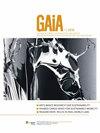Rural bioeconomies in Europe: Socio-ecological conflicts, marginalized people and practices
IF 1.9
4区 社会学
Q4 ENVIRONMENTAL SCIENCES
引用次数: 0
Abstract
Bioeconomy policies claim to contribute to socio-ecological transformations and decreasing rural-urban inequalities. Based on examples of four bioeconomies in rural Europe, we argue that contrary to these claims, such policies to date have not de-escalated existing social conflicts but instead have often further contributed to polarization tendencies. To live up to those proclaimed goals, bioeconomy research and policy need to deprioritize economic growth and turn to more comprehensive considerations of socio-ecological contexts and the integration of the local population and alternative practices.欧洲农村生物经济:社会生态冲突、边缘化人群和实践
生物经济政策声称有助于社会生态转型和减少城乡不平等。基于欧洲农村四种生物经济学的例子,我们认为,与这些说法相反,迄今为止,这些政策并没有缓和现有的社会冲突,反而往往进一步助长了两极分化趋势。为了实现这些宣布的目标,生物经济研究和政策需要降低经济增长的优先级,并转向更全面地考虑社会生态环境以及当地人口和替代做法的整合。
本文章由计算机程序翻译,如有差异,请以英文原文为准。
求助全文
约1分钟内获得全文
求助全文
来源期刊

Gaia-Ecological Perspectives for Science and Society
ENVIRONMENTAL SCIENCES-
CiteScore
2.30
自引率
18.80%
发文量
43
审稿时长
>12 weeks
期刊介绍:
GAIA is a peer-reviewed inter- and transdisciplinary journal for scientists and other interested parties concerned with the causes and analyses of environmental and sustainability problems and their solutions.
Environmental problems cannot be solved by one academic discipline. The complex natures of these problems require cooperation across disciplinary boundaries. Since 1991, GAIA has offered a well-balanced and practice-oriented forum for transdisciplinary research. GAIA offers first-hand information on state of the art environmental research and on current solutions to environmental problems. Well-known editors, advisors, and authors work to ensure the high quality of the contributions found in GAIA and a unique transdisciplinary dialogue – in a comprehensible style.
 求助内容:
求助内容: 应助结果提醒方式:
应助结果提醒方式:


